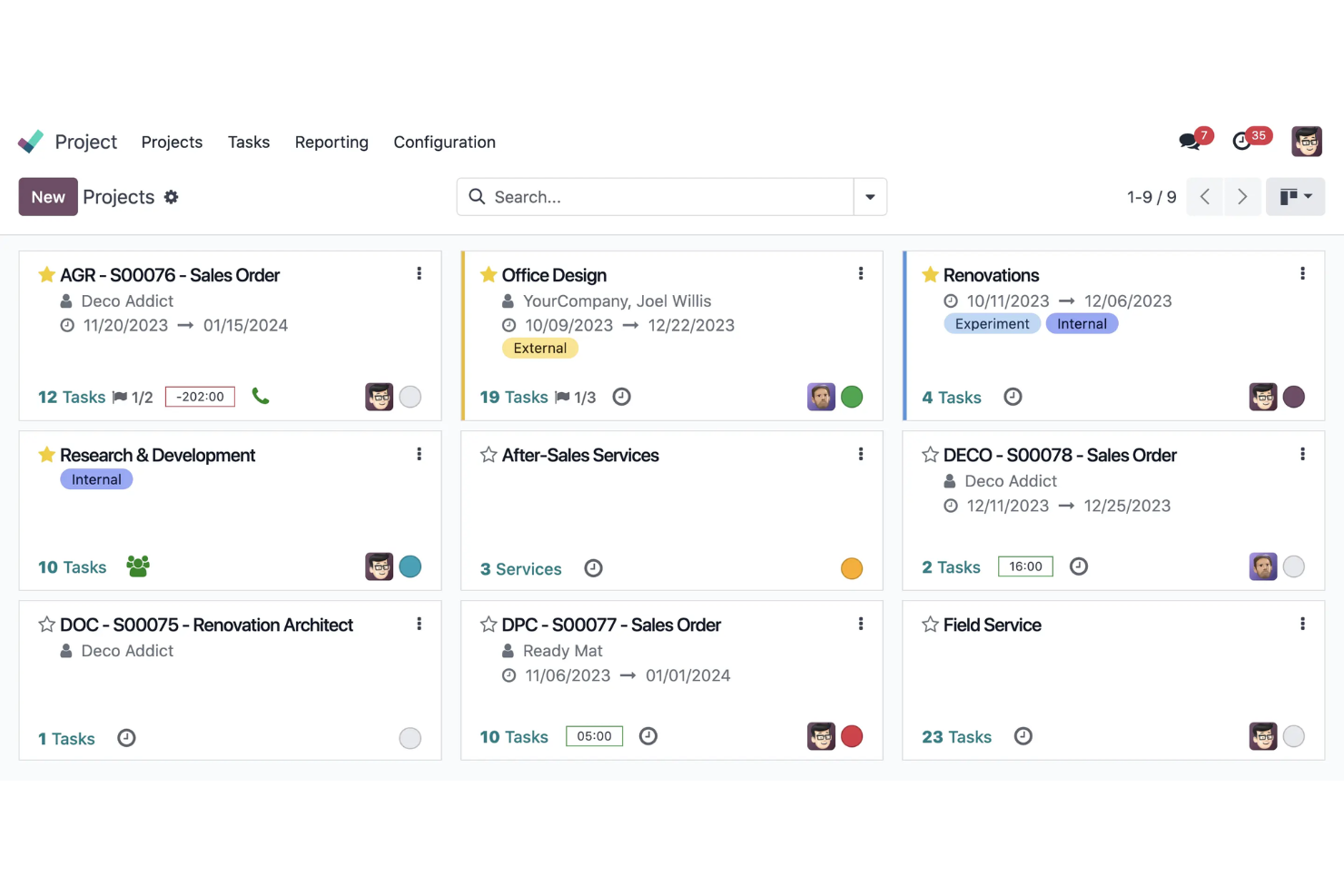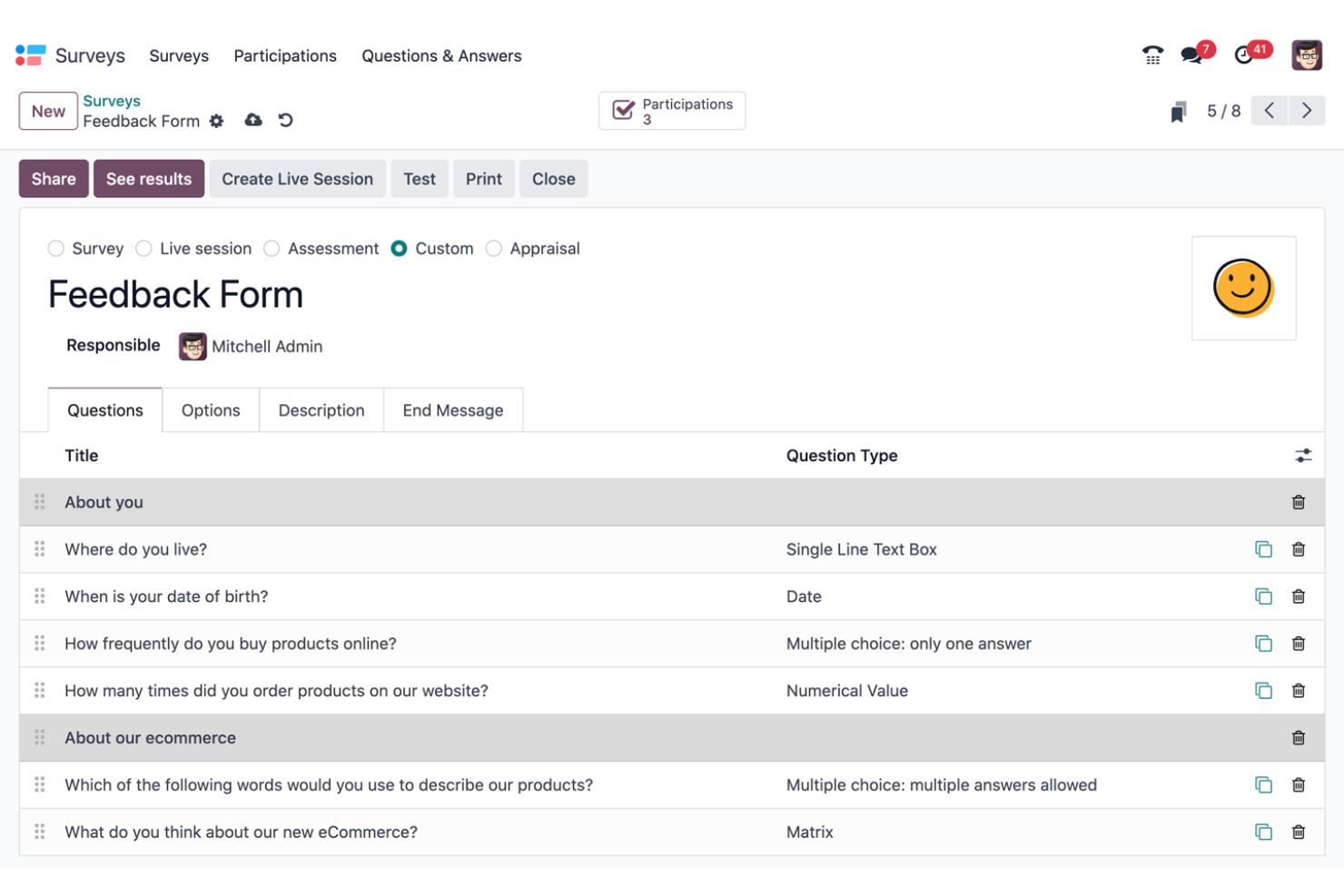Odoo Review: Pros, Cons, Features & Pricing
Having spent years exploring and working with ERP software, I know how important it is to find a system that not only centralizes your operations but also adapts to the unique needs of your business. Odoo is a modular ERP platform that brings together everything from inventory and finance to CRM and project management. It’s especially useful for small to mid-sized companies in industries like retail, manufacturing, and services that need a scalable, flexible solution.
In this Odoo review, I’ve taken a deep dive into its features, strengths, limitations, pricing, and ideal use cases to help you understand where it shines—and where it might fall short. Whether you're a CFO assessing tools from a strategic lens or part of a growing team looking to streamline operations, this guide will help you determine whether Odoo is the right fit.
Odoo Evaluation Summary

- From $7.25/user/month (billed annually)
- Free plan available
Why Trust Our Software Reviews
Odoo Overview
What makes Odoo stand out is its modular design and high level of customization. You can build the system around your specific needs, adding apps as your business grows. This flexibility is great for companies that don’t fit neatly into one-size-fits-all software. While the platform can be complex without technical support, its broad capabilities, integrations, and competitive pricing make it a strong option for growing businesses.
pros
-
All Odoo apps are natively integrated, reducing data silos.
-
It offers a wide range of modules for different business functions.
-
You can customize Odoo to fit your team's specific needs.
cons
-
For some setups, Odoo can be resource-intensive.
-
Some third-party apps or modules may lack polish or support.
-
Your team might find the initial setup a bit complex.
-

LiveFlow
Visit WebsiteThis is an aggregated rating for this tool including ratings from Crozdesk users and ratings from other sites.4.9 -

Float Financial
Visit Website -

Vena
Visit WebsiteThis is an aggregated rating for this tool including ratings from Crozdesk users and ratings from other sites.4.5
How We Test & Score Tools
We’ve spent years building, refining, and improving our software testing and scoring system. The rubric is designed to capture the nuances of software selection and what makes a tool effective, focusing on critical aspects of the decision-making process.
Below, you can see exactly how our testing and scoring works across seven criteria. It allows us to provide an unbiased evaluation of the software based on core functionality, standout features, ease of use, onboarding, customer support, integrations, customer reviews, and value for money.
Core Functionality (25% of final scoring)
The starting point of our evaluation is always the core functionality of the tool. Does it have the basic features and functions that a user would expect to see? Are any of those core features locked to higher-tiered pricing plans? At its core, we expect a tool to stand up against the baseline capabilities of its competitors.
Standout Features (25% of final scoring)
Next, we evaluate uncommon standout features that go above and beyond the core functionality typically found in tools of its kind. A high score reflects specialized or unique features that make the product faster, more efficient, or offer additional value to the user.
We also evaluate how easy it is to integrate with other tools typically found in the tech stack to expand the functionality and utility of the software. Tools offering plentiful native integrations, 3rd party connections, and API access to build custom integrations score best.
Ease of Use (10% of final scoring)
We consider how quick and easy it is to execute the tasks defined in the core functionality using the tool. High scoring software is well designed, intuitive to use, offers mobile apps, provides templates, and makes relatively complex tasks seem simple.
Onboarding (10% of final scoring)
We know how important rapid team adoption is for a new platform, so we evaluate how easy it is to learn and use a tool with minimal training. We evaluate how quickly a team member can get set up and start using the tool with no experience. High scoring solutions indicate little or no support is required.
Customer Support (10% of final scoring)
We review how quick and easy it is to get unstuck and find help by phone, live chat, or knowledge base. Tools and companies that provide real-time support score best, while chatbots score worst.
Customer Reviews (10% of final scoring)
Beyond our own testing and evaluation, we consider the net promoter score from current and past customers. We review their likelihood, given the option, to choose the tool again for the core functionality. A high scoring software reflects a high net promoter score from current or past customers.
Value for Money (10% of final scoring)
Lastly, in consideration of all the other criteria, we review the average price of entry level plans against the core features and consider the value of the other evaluation criteria. Software that delivers more, for less, will score higher.
Core Features
Accounting Management
Odoo's accounting software features automate your invoicing, billing, and financial reporting, helping you stay on top of your finances. It stands out for its ability to integrate with other modules for seamless financial operations.
Inventory Management
With Odoo, you can track stock levels, manage warehouses, and automate restocking. This feature helps you maintain optimal inventory levels and reduce waste.
Sales Management
Odoo’s sales module allows you to manage your sales pipeline, track leads, and close deals efficiently. It integrates with CRM to enhance your sales team's productivity.
Human Resources Management
You can handle employee records, payroll, and recruitment processes with Odoo's HR tools. It simplifies HR tasks, allowing your team to focus on strategic initiatives.
Project Management
Odoo’s project management feature lets you plan, track, and collaborate on projects in real-time. It helps your team meet deadlines and improve project outcomes.
Manufacturing Management
This feature supports production planning, work orders, and quality control. It ensures your manufacturing processes are efficient and meet quality standards.
E-commerce Integration
With Odoo, businesses can merge their online stores, maintaining a constant synchronization between inventory and sales.

Ease of Use
Odoo offers a clean and intuitive interface with drag-and-drop functionality. However, given the platform’s vast capabilities, some users might experience a steep learning curve. While the initial setup might be complex, once configured, Odoo's system simplifies your daily tasks with its seamless integration across functions.

Integrations
All Odoo apps are natively integrated. Third-party integrations must be paid for and include a range of apps, such as Tap Payment Acquirer, Pipedrive, Website Google reCAPTCHA, Zendesk, Zoho, QuickBooks, and Freshdesk.

Odoo Specs
- 360 Degree Feedback
- API
- Attendance Tracking
- Batch Permissions & Access
- Budgeting
- Calendar Management
- Dashboard
- Data Export
- Data Import
- Data Visualization
- Employee Database
- Employee Engagement
- Employee Incentive Management
- Employee Onboarding
- Expense Tracking
- External Integrations
- Feedback Management
- Forecasting
- Multi-Currency
- Multi-User
- Notifications
- Scheduling
- Timesheets
- Travel Management
- Vacation & Absence Calendar
Odoo FAQs
Does Odoo support multiple languages?
What deployment options does Odoo offer?
Is Odoo scalable for growing businesses?
What kind of training resources does Odoo provide?
How does Odoo handle updates and upgrades?
How does Odoo handle data security and compliance?
Can Odoo support multi-company operations?
What customization options are available in Odoo?
Does Odoo offer support for mobile devices?
How does Odoo manage user access and permissions?
What's Next?
Ready to compound your abilities as a finance professional? Subscribe to our free newsletter for expert advice, guides, and insights from finance leaders shaping the tech industry.




